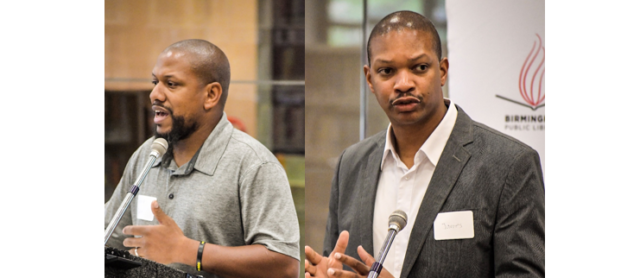
Birmingham Times staff report
Ronnie Rice, President, 100 Black Men of Metro Birmingham
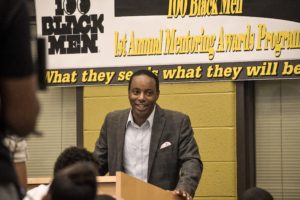
The 100 Black Men of Metro Birmingham earlier this year held its first annual mentoring awards program, honoring nine students—and that’s only the beginning, said Ronnie Rice, an attorney and president of the organization.
Rice, who works with Alexander Shunnarah Injury Lawyers PC at the firm’s Birmingham headquarters, said his mentoring group is starting a new program called 100 Black Men Collegiate.
“They will be college students who will be mentees,” he said. “Once they get a certain age and graduate, they’ll have an opportunity to go through our process and become part of the 100 Black Men full chapter.”
100 Black Men of America is an Atlanta, Ga.-based men’s civic organization with more than 100 chapters across the U.S., including one in Birmingham. The group’s motto is “What They See is What They’ll Be,” and its goal is to educate and empower children and teens by providing positive role models and leaders to guide the next generation of African Americans and other youth.
Rice is a native of Prichard, Ala., and his interests include law, human resource development, leadership, and organizational development. At the Shunnarah law firm he serves as a liaison to the legal team and oversees corporate social responsibility. He also volunteers with the Boys and Girls Club of Central Alabama, the United Dreamers Foundation, the Morehouse College Alumni Association of Birmingham, the United Negro College Fund of Birmingham, and the Phoenix Club.
Rice serves as both president of and a mentor with 100 Black Men of Metro Birmingham, which counts among its members Jefferson County District Attorney Danny Carr and Sherriff Mark Pettway, as well as local educators, judges, and business leaders.
“It’s not just about the title,” Rice said. “It’s about people who see the needs of the community from a global perspective. These are people who see deficits in our community, understand the need, and are putting resources behind it to ensure each student’s success.”
Rice’s academic degrees include a Bachelor of Arts in psychology from Morehouse College in Atlanta; a Master of Arts in organizational leadership and a Doctor of Philosophy in human resource development degree from Regent University in Virginia Beach, Va.; and a Juris Doctor from the Miles Law School in Birmingham.
For more information about 100 Black Men of Metro Birmingham, email Ronnie Rice at Ronnie.rice67@gmail.com.
Marcus Carson, Founder and Executive Director, Growing Kings Inc.
Growing Kings Inc., a local 501(c)3 nonprofit organization dedicated to improving the lives of underserved boys and men of color, and 100 Black Men of Metro Birmingham have developed programs designed to follow the young people in their programs from
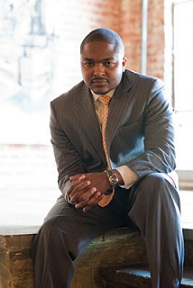
elementary school through high school.
Growing Kings uses paid program managers who teach its curriculum during the school day, said Marcus Carson, the organization’s founder and executive director. Volunteer mentors work alongside the program managers to provide instruction on the group’s three-level Journey of the King curriculum: Prince Charming for fourth and fifth graders; Measures of a Man for middle school students; and Scholars and Gentlemen for high schoolers. Each level includes lessons that correspond with each student’s age and grade—the youngest level focuses on literacy and mathematics; middle school devotes attention to etiquette, chivalry, domestic violence, health, and business and industry; and the high school phase targets manhood and career readiness.
“We understand that our students have a big world in front of them, tons of obstacles already in front of them,” said Carson. “It’s not enough to have a conversation that is repetitive but may not be relevant to where they are in their lives. In traditional mentoring, that’s typically the platform: … introduce a caring adult, match him or her with a child, and hope something transforms between them. We can’t take that chance of leaving it up to hope when we know things that will help our students improve their life outcomes.”
For more information about Growing Kings, visit www.growingkings.org.
James Sutton, Mentor Coordinator, the Dannon Project
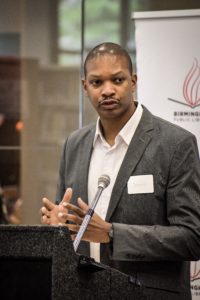
James Sutton, a native of Pearl, Miss., has lived in Birmingham since 2002, during which time he has worked in both corporate and community settings.
In December 2017, he accepted a job as mentor coordinator with the Dannon Project—a local organization founded 20 years ago by WBRC-TV Fox 6 anchorman and sports personality Jeh Jeh Pruitt and his wife, Kerri, to provide support services and resources to men and women who have had some contact with the criminal justice system. As mentor coordinator, Sutton works to recruit, train, and match mentors with program participants. He also mentors participants individually and conducts group mentoring sessions.
Sutton splits his time between mentor recruitment efforts in the community and mentoring participants on site at the Dannon Project. One of the goals of the program is to ensure that every person who desires a mentor gets matched. All participants receive some level of mentoring while in the program, though it is invaluable to have an individual mentor dedicated to addressing a participant’s specific needs, questions, and challenges. Participants entering the program complete a mentee profile sheet on which they describe what they would like in a mentor.
Dannon Project participants are 18 and older, and they come to the organization with a wide variety of personal goals and experiences. Some are seeking friendship, spiritual growth, and accountability. Some are looking for career-planning advice. Some are parents working to build a life for their families. Some are trying to overcome the challenges of their past. Some have endured traumas early in life and need emotional support. Some are business-minded and need the right mentor to help them become the moguls they are destined to be.
Mentor requirements at the Dannon Project are simple. First, prospective mentors complete a general mentor application and profile sheet describing their interests. Then they attend a one-hour training that includes a question-and-answer session. Mentors and mentees are matched based on shared interests and backgrounds. Once matched, mentors should remain with their mentees for up to 12 months and communicate with the mentee for at least five hours a month, including at least one hour face-to-face.
Anyone interested in becoming a Dannon Project mentor or inviting Sutton to speak to their group about mentoring can email mentoring@dannonproject.org or call 205-202-4072.
Richard Cade, Founder and Director, The Man Project
Richard Cade has said he’s seen several support groups, retreats, summits, and conferences for women, which is not a problem.
“I respect and admire that, but I’m striving to be a product of faith to our young men and fathers to help them understand the importance of their presence in the community, in their homes, in their churches,” he has said. “The Bible says in Proverbs 27:17 [NIV], ‘As iron sharpens iron, so one person sharpens another.’ I want to be a tool to get connected and uplift my fellow brothers.”
Cade, born and raised in Birmingham, founded The Man Project in 2015. His favorite
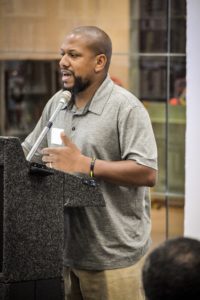
quote is “God does not give us what we can handle. He helps us handle what we are given.”
“I truly believe that The Man Project mentorship program can produce two types of men: profitable and productive,” Cade said of the organization, which caters to males from age 10 well into adulthood. “[It provides] leadership development for sustainability throughout their lives, which means they are ready to achieve their goals, assist their colleagues, and understand how their roles can make a difference in the community and in their own futures.”
Cade told Birmingham author Chandra Sparks Splond in an interview, “I have always been committed to sharing my life experiences to help others, but especially to help young men avoid making poor life choices. … Our program is here to help encourage and inspire men, to push them to be the best they can be in their homes, work, school, and community.”
For more information about The Man Project, contact Cade at Tmanproject@outlook.com or 205-447-1699.



